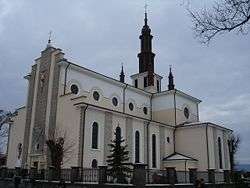Dubiecko
Dubiecko [duˈbjɛt͡skɔ] (Yiddish: דיבעצק Dubetzk) is a village in Przemyśl County, Subcarpathian Voivodeship, in southeastern Poland. It is the seat of the gmina (administrative district) called Gmina Dubiecko. It lies approximately 28 kilometres (17 mi) west of Przemyśl and 36 km (22 mi) southeast of the regional capital Rzeszów.[1]
Dubiecko | |
|---|---|
Village | |
 Parish church | |
 Dubiecko | |
| Coordinates: 49°49′32″N 22°23′24″E | |
| Country | |
| Voivodeship | Subcarpathian |
| County | Przemyśl County |
| Gmina | Dubiecko |
| Highest elevation | 370 m (1,210 ft) |
| Lowest elevation | 280 m (920 ft) |
| Population | 1,150 |
| Website | www.dubiecko.itl.pl |
The village has a population of 1,150.
History
As a result of the first of Partitions of Poland (Treaty of St-Petersburg dated 5 July 1772, the Galicia area was attributed to the Habsburg Monarchy.[2] DUBIECKO was a village in the Przemyśl county (Bezirkshauptmannschaft) [3] in Austrian Galicia.
For more details, see the article Kingdom of Galicia and Lodomeria.

Jewish History
During World War I, in 1915 the town was captured by Russia, during the Rosh Hashana (Jewish new year) festivities. Some Jews were killed during the rampage that followed. In 1918 local peasants attacked Jews and took Jewish belongings and property.
The town had about 1000 Jews, most of them Hassidic (ultra orthodox), and several religious Zionists.
On September 17, 1939, (On the Jewish 'Gedalya' fast day) German soldiers entered Dubiecko, two days after the slaughter of the Jews of Dynow on the second day of Rosh Hashana (September 15, 1939). They caught 11 Jews and killed them, burning the synagogues and beating the men attempting to save holy scrolls, including the Rabbis.
A week later (eve of the Succoth festivities week), on September 27 the remaining Jews were ordered to assemble at the town square. From there they were marched across the border, and the San river, while being beaten and brutalized, to Soviet territory. Some drowned during the crossing. Peasants on both sides of the river robbed the Jews of whatever little possessions they had. Some ended up in Przemyśl others in Lvov. Many perished on the way. The young Rebbe of the town perished with his wife in Przemyśl, after returning from Jerusalem to Poland just before the war.[4] Most of the remaining Jews perished later after Operation Barbarossa in June 1941, almost two years later.
See also
References
- "Central Statistical Office (GUS) - TERYT (National Register of Territorial Land Apportionment Journal)" (in Polish). 2008-06-01.
- Atlas des peuples d'Europe centrale, André et Jean Sellier, 1991, p.88
- Die postalischen Abstempelungen auf den österreichischen Postwertzeichen-Ausgaben 1867, 1883 und 1890, Wilhelm KLEIN, 1967
- The destruction of Dubiecko on JewishGen
| Wikimedia Commons has media related to Dubiecko. |
